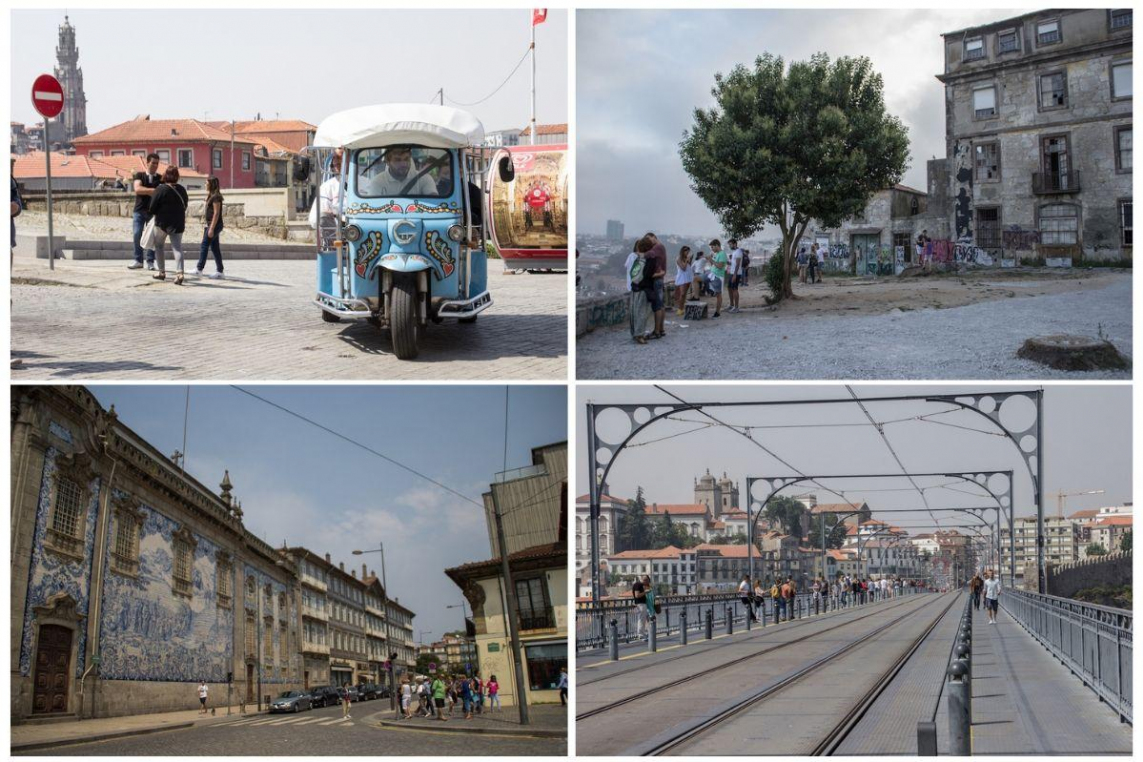Portugese architects confront tourists with reality behind azulejos

‘Look at these facades,’ our guide says, pointing to several ones in the street scene. Beautiful, authentic facades, with those typical colourful tiles or azulejos. Then we gradually start to notice: there is actually nothing left behind the facades. They are only kept standing by a few wooden beams or metal constructions.
It is called fachadismo, explains Pedro Figueiredo. He leads a group of Belgian, Spanish and American tourists around in his city, Porto. The facades remain, as a front for what they conceal: the vacancy, a void which rich investors and project developers fill up with Airbnb apartments or hotels. As long as the historical “look & feel” remains, thanks to the facade.
At the height of the recession Pedro made a remarkable career switch: the architect became a travel guide. There was no job to be found for the young, highly trained Portuguese. Tourism however offered “work”, even though in Pedro’s case it is more a hobby that got out of hand. Unlike about half a million of his peers, he didn’t look for professional opportunities elsewhere. He loved his city too much for that.
The Worst Tours shows you the disruptive effect of mass tourism and real estate speculation on a city and its inhabitants
That also applies to the two other architects with whom he founded The Worst Tours in 2012. Since then, they have led hundreds of tourists on a tour of Porto. The story those visitors get to hear is that of the disruptive effect of mass tourism and speculation on the housing market of a historical city centre and its inhabitants. Of policy decisions to lift a country out of recession, which at the same time cause profound damage to the social fabric and especially affect the ordinary people.
Because even though the low point of the crisis in Portugal has been passed since some time and a leftist coalition government has turned back the austerity measures of its centre-right predecessor, the repercussions are still visible.
Bubble of the Portuguese real estate market
During the tour, we make a stop in the north-east of the city at a wonderful, green villa, surrounded by an equally wonderful garden with exotic plants. It reminds one of Pippi Longstocking’s Villa Villekulla and evokes the splendour of a time long past.

The first owners were rich Brazilian-Portuguese merchants, who were only too happy to show off the wealth they had gathered through their transatlantic commerce. But the house today primarily exudes faded glory. It stands vacant since many years and was, according to neighbours, for sale for 1 million euros.
Those are extreme figures, Pedro says. ‘In my street unrenovated apartments are currently for rent for 700 euros. That’s absurd if you realise what the minimum wage in this country is.’ For those who don’t know: according to Eurostat, the minimum wage amounted to 590 euros in 2015 and 700 euros in 2019. But Pedro believes the minimum wage only went up from 485 euros in 2014 to 600 euros in 2019.
The rental prices in the historical part of Lisbon however increased with 56 per cent between 2012 and 2017. In Porto, the rise even amounted to a whopping 88 per cent.
It’s no coincidence that former prime minister Pedro Passos Coelho implemented several austerity measures in 2012, as agreed with – or rather imposed by – the European troika (the IMF, European Central Bank and European Commission ). He made it easier for landlords to change the rental prices. Until then they remained stable for years, allowing residents – often elderly persons – to live for decades in the same house in the historical heart of the city.
About 13 million tourists visited Portugal in 2018, while the country itself has 10.3 million inhabitants.
The consequence of this measure? Between 2012 and 2017, at least 4,300 people were evicted from their homes because they could no longer afford the rising rental prices. 2,968 people in Lisbon, 1,348 in Porto, to be precise. An apartment costing 2,000 euros per month, was no longer unusual in Lisbon in 2018.
At the same time, it became easier for landlords to evict tenants from their house for the sake of renovations. That also affected the rental rates, and furthermore inspired landlords to no longer rent the renovated apartments to locals afterwards, but to tourists via Airbnb.
That’s because the development of tourism was also part of Coelho’s policy. Those numbers don’t lie either: about 13 million tourists visited Portugal in 2018, while the country itself has 10.3 million inhabitants. For Lisbon specifically, the numbers are even more stunning: 4.5 million tourists, with 500,000 local residents. ‘But tourism only fixed the vacancy problem temporarily, it couldn’t resolve the absence of an economy which can also maintain a city and its population,’ states Pedro.

Migration as crisis 2.0
For the highly-educated Portuguese youth, Coelho however had just one advice: leave. Unemployment had increased so strongly because of the recession and this was the only solution which he offered. ‘It was the crisis 2.0,’ declares Pedro about this brain drain. ‘That’s no policy for a prime minister to carry out.’
‘We just need 10 per cent of the vacant houses to shelter the homeless. 90 per cent will remain available for speculation.’
The massive outflow contributed to the increasing vacancy in Porto, adds Pedro. And this vacancy offered investors and developers the chance to buy vacant, and often run-down, houses for next to nothing.
Coelho also came up with a suitable scheme for this particular issue: investors from outside the European Union who at least invested 500,000 euros in Portuguese real estate, received a so-called “golden visa” – a residence permit for five years. At least 9,000 of these visa have already been handed out.
The government prefers to see vacant houses to be turned into hotels instead of them being used for social purposes, is the criticism of The Worst Tours. ‘There are about 2,000 homeless people in Porto according to local NGOs,’ explains Pedro. ‘We just need 10 per cent of 20,000 the vacant houses to provide them with shelter. 90 per cent will still remain available for speculation.’
Also EU citizens contributed to the ever-increasing prices on the housing market. Those who spend their retirement in Portugal and on top of that buy a house there, do not only profit from the relatively cheaper life for northern Europeans in Portugal. They receive various tax benefits as well.
This way, buying an own house became unaffordable for most Portuguese. EU citizens with more financial means and advantages can more easily outbid them, what also caused the prices of properties for sale to rise.

‘Housing is becoming a social right’
Since 2015, a minority government is in power in Portugal, under the leadership of prime minister of Antonio Costa of the centre-left socialist party. The government is supported by extreme left-wing parties. The minimum wage and basic pension were raised, the unemployment and public debt decreased strongly, but the housing crisis remains.
It however seems that better times are coming. The Portuguese parliament approved a new basic law in July. The main principle behind this: housing again has to be perceived as a civil right. ‘There were already basic laws for health, education and social security and from now on housing is a social right as well,’ stated member of parliament Helena Roseta, who was strongly committed to the introduction of the law, after the vote. ‘There is a real housing crisis going on, which not only affects the poor but the middle class and youth as well.’
‘It can still take up to three years before someone is assigned social housing. While the needs are urgent.’
The Worst Tours guide Pedro is happy with the law, but remains cautiously positive. The years of investments in tourism and attracting foreign capital went at the cost of social initiatives and a clear spatial planning policy.
Because of the lack of such a basic law concerning housing, there was room for speculation during our 43 years of democracy, feels Pedro. ‘And since the deregulation of the private housing market in 2012, the “bailout” (of Portugal by the IMF, ECB and EC) led to gentrification and a boom of new hotels, hostels and Airbnb apartments.’ So this law actually came too late.
‘We certainly encourage the implementation of the basic law, because it pushes the next governments to provide extra social housing and limit the real estate speculation. But it can currently still take up to three years before someone is assigned social housing. While the needs are urgent,’ says Pedro.
The basic law obliges future governments to develop a targeted policy for housing as a right, with measures to protect the most vulnerable groups on the housing market. This will again be the job of prime minister Costa, who formed a new government after elections in October.
At the end of his tour, Pedro makes a stop at a modernistic building. Cinema Batalha was effectively a cinema until 2000. It was temporarily turned into a cultural centre between 2006 and 2010, but since then it is standing vacant.
There are plans for the building, but reallocating it is hard. In April, the city council launched a call for architects to file a proposal for the renovation of the place. The idea is to once again convert it into a cinema building. ‘I hope they never turn this into a hotel.’
The Worst Tours. Make an appointment via this online form. Disclaimer: for a tour with a tuk-tuk, including a visit to the Porto cellars for a tasting, The Worst Tours is effectively the worst tour to follow.
Translated from Dutch by Andy Furniere
Maak MO* mee mogelijk.
Word proMO* net als 2793 andere lezers en maak MO* mee mogelijk. Zo blijven al onze verhalen gratis online beschikbaar voor iédereen.
Meer verhalen
-
Report
-
Report
-
Report
-
Interview
-
Analysis
-
Report










 Oxfam België
Oxfam België Handicap International
Handicap International